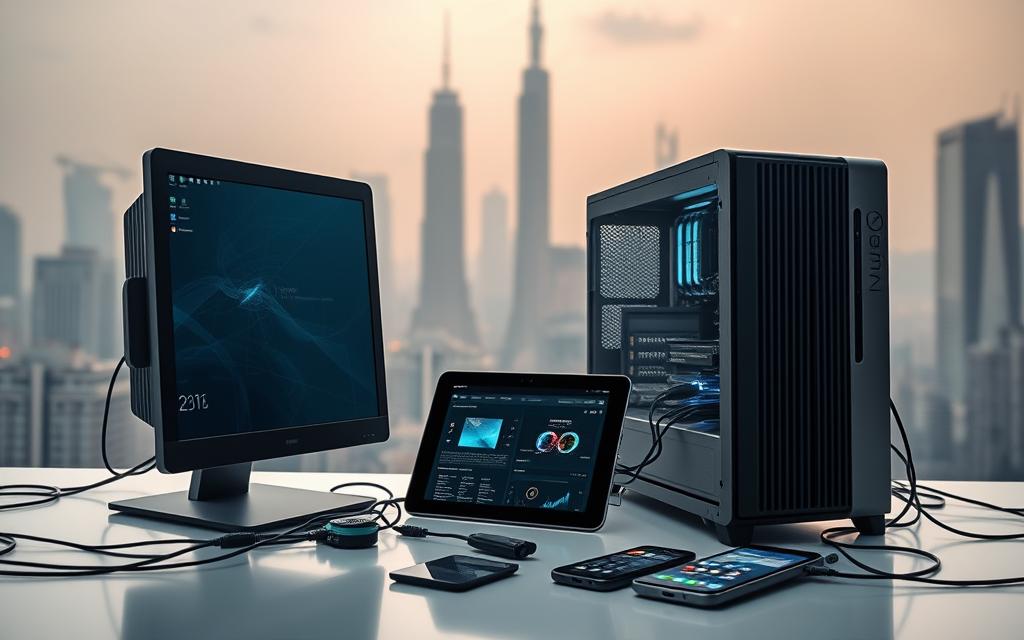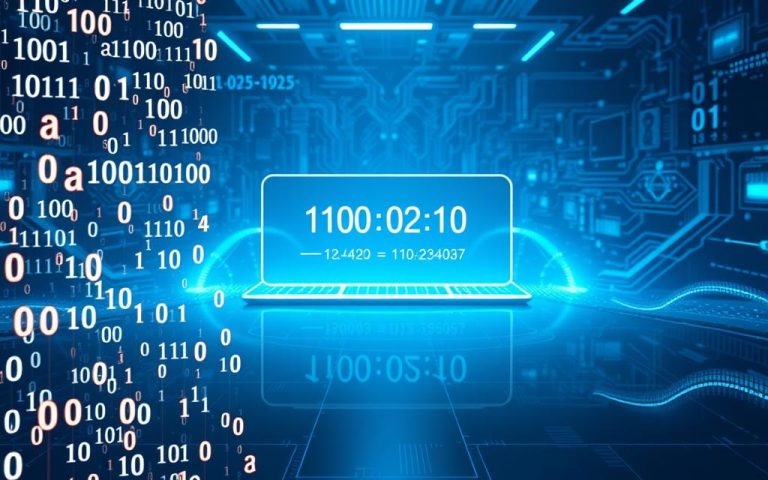Importance of Computer Systems in Modern Life
Computer systems have revolutionised our interaction with technology. These powerful machines are now essential to modern life. They’ve transformed communication, work, and personal experiences1.
Computers are everywhere, with 90% of large organisations using them1. Their impact goes beyond traditional computing. They drive efficiency and innovation in businesses of all sizes.
About 70% of small businesses rely on computers daily1. This shows how accessible and valuable these systems have become.
Computer systems have reshaped modern technology. They enable unparalleled connectivity and streamline complex processes. These systems provide solutions across various industries.
The global computer systems market is growing steadily. It’s projected to increase by 5.5% from 2021 to 20281.
Computer systems are widely adopted in many sectors. They’re indispensable in education, banking, healthcare, and entertainment. These marvels enhance productivity, communication, and personal experiences1.
Understanding Computer Systems in Today’s Digital World
Digital computing has transformed our tech interactions. Computer system components are the backbone of modern technology. They enable complex processes driving innovation across sectors2.
Computer systems blend advanced hardware and software to process information quickly. They’ve changed how organisations manage data and solve problems.
These systems help create innovative solutions in various fields3.
Essential Computer System Components
Modern computer systems comprise several critical elements:
- Central Processing Unit (CPU): The computational brain executing instructions2
- Random Access Memory (RAM): Temporary data storage for active processes2
- Storage devices: Permanent data retention through HDDs and SSDs2
- Input/Output devices: Enabling user interaction2
Technological Evolution
Computer systems have grown from simple calculators to complex, interconnected networks. Quantum computing is the latest advancement in this field.
It promises to tackle incredibly complex computational challenges3.
| Computer System Type | Primary Use |
|---|---|
| Personal Computers | Individual user tasks |
| Mainframe Computers | Large organisational processing |
| Distributed Systems | Network-based computational tasks |
Core Capabilities
Modern computer systems offer impressive abilities across various sectors. They excel in healthcare data management and educational resource delivery3.
These systems enable advanced data analysis and streamline complex processes. They’re the driving force behind technological innovation.
Why Are Computer Systems Important
Computer systems are vital to modern technology. They boost efficiency and connectivity worldwide. These systems revolutionise our work, communication, and information processing4.
Computer systems go beyond simple calculations. They enable organisations to achieve remarkable productivity gains. Businesses can improve efficiency by investing in robust computer systems5:
- Enhance workplace productivity by up to 25%
- Reduce potential hardware failures by 80%
- Improve system performance through regular maintenance
Modern computer systems offer crucial advantages in various fields:
| Domain | Key Benefits |
|---|---|
| Business | Streamlined operations, data analytics |
| Communication | Global connectivity, instant information sharing |
| Innovation | Research acceleration, problem-solving capabilities |
Computer systems turn complex challenges into manageable solutions. They reshape our understanding of productivity and innovation4.
From personal computing to enterprise tech, these systems continue to evolve. They drive progress in countless areas of our lives.
“Technology is best when it brings people together and creates opportunities for everyone.” – Unknown
Impact of Computer Systems on Business and Industry
Advanced computer systems have transformed the modern business landscape. They’ve revolutionised how organisations operate and compete in the digital era. Business computer systems are now essential strategic assets for companies across various sectors6.

Computer systems now permeate every aspect of business operations. They’re used in product creation, marketing, and administration6. Industrial technology has enabled unprecedented efficiency and data-driven decision-making7.
Business Intelligence and Data Analytics
Companies use sophisticated information systems to collect and analyse complex data sets. Management information systems have transformed how businesses gain insights. These systems offer powerful tools for data interpretation and decision-making.
- Comparing internal analyses with external market conditions7
- Facilitating cross-departmental collaboration7
- Providing comprehensive reporting tools for executives7
Industrial Automation and Manufacturing
Precision and efficiency define modern industrial technology. Businesses rely on advanced computer systems to streamline production processes. These systems reduce waste and enhance overall operational performance.
Digital Marketing and Customer Relations
The digital landscape has reshaped marketing strategies. Online platforms are now critical for customer engagement. Businesses use data-driven approaches to reach wider audiences8:
- Over 168 million people read newspapers online
- Approximately 83 million watch online videos daily
- Facebook attracts over 1 billion monthly visitors8
Computer systems are no longer just tools, but strategic partners in business success.
Information technology and corporate strategies are increasingly interdependent. This highlights the critical role of business computer systems. They’re essential for achieving organisational objectives8.
Computer Systems in Healthcare and Education
Computer systems have transformed healthcare and education. They’ve changed how professionals deliver services and learners engage with information. The digital landscape has reshaped these domains through innovative approaches.
In healthcare, computer systems are vital tools for medical professionals. Hospitals use advanced technologies to improve patient care and streamline processes. Electronic health records (EHRs) allow seamless data sharing among healthcare professionals.
EHRs improve treatment coordination and information accessibility9. Telemedicine platforms have expanded healthcare reach, especially in rural areas. They connect patients with medical experts through digital channels9.
Healthcare Technology Innovations
- Computer-aided diagnostic software increasing medical image interpretation accuracy9
- Mobile health applications supporting preventive care strategies10
- Machine learning algorithms enhancing research and personalised treatment plans10
Educational computing has also transformed learning environments. Digital platforms offer interactive, personalised experiences for diverse learning styles. Students can access vast information sources and engage in online courses.
These platforms help students develop critical digital literacy skills. They open up new possibilities for learning and growth.
Educational Computing Developments
- Interactive digital classrooms
- Personalised learning pathways
- Global knowledge sharing platforms
“Technology is best when it brings people together and creates opportunities for collaborative learning and innovation.”
Healthcare technology and educational computing are creating a powerful shift. They empower professionals and learners to navigate complex digital landscapes. This convergence offers unprecedented efficiency and insight109.
Computer Systems in Daily Life and Entertainment
Computer systems have transformed how we interact with technology daily. These digital platforms are now essential for home entertainment and personal communication.
Digital entertainment has expanded, offering vast access to content and experiences. About 63.5% of the world’s population uses the internet, connecting through various digital platforms.
The gaming industry generates over $200 billion in revenue. Mobile gaming dominates this lucrative market.
- Online shopping has transformed consumer behaviour, with global e-commerce sales reaching $4.28 trillion in 202011
- Streaming services now boast over 1.5 billion global subscribers11
- Social media platforms connect over 4.9 billion users worldwide11
Computers are vital for everyday computing, managing various aspects of our lives. They support banking, communication, entertainment, and personal productivity.
Technology has transformed our world, making digital experiences integral to modern living.
Users must be aware of potential challenges like digital addiction. Ergonomic health concerns are also important to consider.
Balanced use of computer systems helps harness their potential. It also ensures we maintain our personal well-being.
Conclusion: The Future of Computer Systems in Society
Computer systems are becoming essential in our daily lives. Technology is reshaping how we interact, work, and learn. By 2030, 80% of jobs will require digital skills12.
Emerging technologies are set to revolutionise our digital experience. Job opportunities in IT are growing faster than other sectors. AI, quantum computing, and IoT will create new opportunities for innovation13.
Digital connectivity has transformed global interactions. Over 90% of the world’s population is now connected to the internet12. Computer systems empower communities and drive economic growth14.
Success in this field requires continuous learning and adaptation. Professionals must take specialised courses in emerging fields like cloud computing. Data science and blockchain technology are also important areas to study13.
The future of computer systems is an exciting journey. It promises technological innovation and societal transformation. We’re on the brink of a new digital era.
FAQ
What are the core components of a modern computer system?
How have computer systems transformed business operations?
What role do computer systems play in healthcare?
How do computer systems impact education?
What are some everyday applications of computer systems?
What emerging technologies are likely to influence future computer systems?
How have computer systems evolved over time?
Why are computer systems considered essential in modern society?
What challenges are associated with increasing computer system usage?
How do computer systems support global connectivity?
Source Links
- https://www.mbaknol.com/information-systems-management/importance-of-computer-in-the-modern-society/
- https://www.studysmarter.co.uk/explanations/computer-science/computer-systems/
- https://online.keele.ac.uk/the-importance-of-computer-systems/
- https://www.techdonut.co.uk/computer-hardware/business-computer-systems/business-computer-systems-overview
- https://cloudconsole.ph/why-is-computer-system-maintenance-important/
- https://smallbusiness.chron.com/importance-computers-business-4012.html
- https://onlinemba.wsu.edu/blog/what-are-information-systems-and-how-do-they-benefit-business
- https://www.lbtc.co.uk/information-technology-blog/information-systems-transforming-business/
- https://www.wheelhouseit.com/wow-hospital-computer-systems-are-making-a-huge-impact/
- https://pmc.ncbi.nlm.nih.gov/articles/PMC4869246/
- https://www.solweb.co.uk/blog/the-influence-of-computers-on-society-transforming-the-modern-world
- https://theteacher.info/index.php/2-1-1-fundamentals/notes/625-importance-of-computer-systems-notes
- https://www.youngwonks.com/blog/why-is-computer-science-important
- https://www.jaroeducation.com/blog/case-study-8-surprising-ways-computer-science-has-benefited-society/









